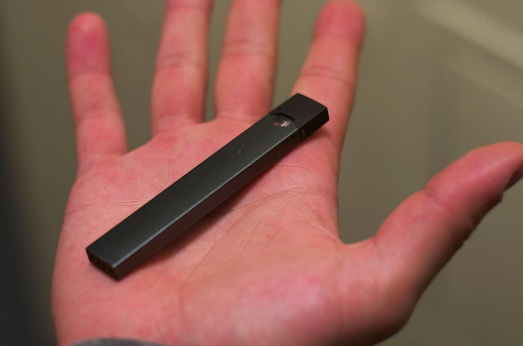Juuling: An Epidemic That Must End

What is a Juul?
The iPhone of e-cigarettes, also known as a Juul, has invaded school bathrooms nationwide. Seriously, if one walks into a bathroom at an American high school, the chances are quite literally one in two that someone is “Juuling” inside (yes, this includes SHC!). The Juul is an e-cigarette supposedly designed to help smokers quit, but, instead has become the newest trend, affecting millions of students nationwide. Many teenage Juul users do not believe they are “vaping,” but instead “Juuling,” which carries a much lesser connotation. Personally, many of my friends fail to see the similarities between cigarettes and vaping, yet e-cigarettes are presumed to cause similar health consequences (the health consequences of electronic cigarettes have not yet been established). Juul has capitalized on the ignorance of teens nationwide in the name of “helping adult smokers quit” (Juul). Now Juul, if the majority of your users are teenagers just trying to get a quick “heady” (also known as a buzz), are you genuinely fulfilling your companies supposed mission to “help adult smokers quit” (Juul)? We (teenagers, myself included) are inherently ignorant, and the temptation of Juuling merely is too much for most of us to overcome.
What makes the Juul so tempting to teenagers?
Although I don’t own a Juul, many, if not most, of my friends do, for a variety of reasons. Juul uses a patented formula of nicotine salts to manufacture Juul Pods, which is what gives it such an edge over other e-cigarette manufacturers. These salts provide the “headrush” that most teen Juul users seek. Besides, the deliciously flavored Juul Pods, which come in a variety of flavors, including mango, fruit medley, and mint, certainly aren’t turning anybody off. Juul’s early marketing campaigns featured attractive young models, who did not fit the demographics of typical cigarette smokers. If Juul products actually try to appeal to “adult smokers,” as their website states, then why does the company feature models in their promotional materials that appear to be under the age of twenty-one? I believe that many teens subconsciously enjoy Juuling because it is something fun to do, especially when grinding through an entire school day. Although my peers almost universally view the Juul as a fun technology device, in reality, it’s simply a slightly less dangerous cigarette. I constantly hear “cigarettes are gross” coming out of the mouths of the biggest Juul “fiends” (the teenager word for an addict). Man, the irony…
The Fix
The Juuling craze has reached insane heights. I know many people who smoke a pod a day, which is equivalent to a pack of cigarettes. Imagine the judgment kids would face if they smoked a pack of cigarettes a day! The double standard is indisputable and requires desperate measures to be corrected.
As grown up as we high schoolers believe we are, there is a reason we aren’t considered adults until the age of 18. We are too easily influenced by peers and social media and need extra protection from the dangers of the world, of which the Juul and other vaping devices are great examples. The rise of similar vaping devices, notably the Sourin, has demonstrated that Juul started an epidemic that other manufacturers have begun tapping into. I don’t believe that health education is enough, as too often with teens information goes in one ear and right out the other. To end this epidemic before it’s too late, local, state and the federal governments need to resort to unprecedented measures. Otherwise, in twenty years, a great number of adults will be users of electronic cigarettes. Sounds like a public health crisis to me. I propose that the federal government take the step that San Francisco has already taken, only allowing tobacco flavored Juul pods and juices (for other vapes) to be sold. A ban in San Francisco is not enough as teens can simply drive to Daly City and use their fake ID’s to buy flavored pods. After the legislation is passed, teens will immediately begin to see a connection between cigarettes and vaping, and the rate of teens who use electronic cigarettes will quickly fall. I understand that this is a drastic, unprecedented measure that would undoubtedly alienate many adults and be a symbol of government over-regulation, but if we don’t want a lung cancer epidemic in the future, banning flavored vaping products is our only option.
Sources
“The Smoking Alternative, Unlike Any E-Cigarette or Vape | JUUL.” JUUL | The Smoking Alternative, Unlike Any E-Cigarette or Vape, www.juul.com/.
“FDA Chief Calls Youth e-Cigarettes an ‘Epidemic’.” The Washington Post, WP Company, 12 Sept. 2018, www.washingtonpost.com/national/health-science/fda-chief-calls-youth-use-of-juul-other-e-cigarettes-an-epidemic/2018/09/12/ddaa6612-b5c8-11e8-a7b5-adaaa5b2a57f_story.html?utm_term=.86bee3915e4d.
Richtel, Matt, and Sheila Kaplan. “Did Juul Lure Teenagers and Get ‘Customers for Life’?” The New York Times, The New York Times, 27 Aug. 2018, www.nytimes.com/2018/08/27/science/juul-vaping-teen-marketing.html
Belluz, Julia. “Juul, the Vape Device Teens Are Getting Hooked on, Explained.” Vox, Vox, 22 Aug. 2018, www.vox.com/science-and-health/2018/5/1/17286638/juul-vaping-e-cigarette.
“Study: Savvy Social Media Campaigns Spur Growth In JUUL Device Use – News Hub – Faculty, Press Releases, Research, School of Public Health.” News Hub, 4 June 2018, news.gsu.edu/2018/06/04/study-shows-savvy-social-media-campaigns-spur-growth-in-juul-device-use/.






Avinash Reddy • Jul 10, 2019 at 12:01 pm
Why did you choose to write this post?
John Cena • Dec 12, 2018 at 10:22 pm
Fax